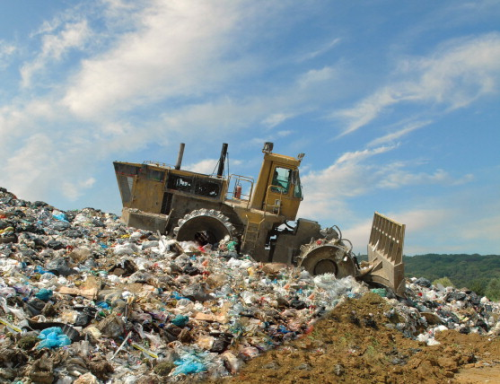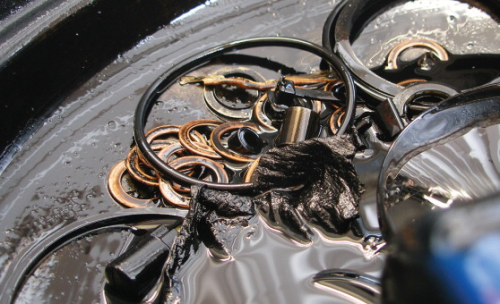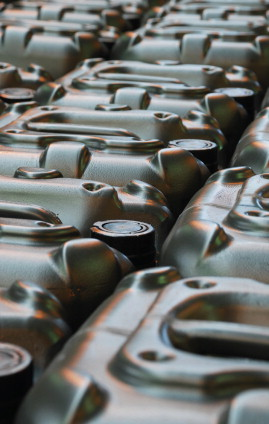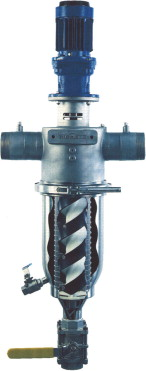



A pdf version of this article is available on the right-hand side under 'Downloads'
The United States Environmental Protection Agency (EPA) has published a document Collecting used oil for recycling/reuse. In it the EPA estimates that, in the United States alone, around 200 million gallons of used motor oil are improperly disposed of by being dumped on the ground, sent to landfill or poured down storm sewers and drains. The organisation adds that if all of the used oil that is improperly disposed of were properly managed, the United States could save thousands of barrels of oil each day. Used oil that is properly handled can be re-refined into lubricants, processed into fuel oils, and used as raw materials for the refining and petrochemical industries.
Through waste oil recovery and reuse programmes, the hazard of improper waste oil disposal can be turned into a valuable resource. Companies are now taking advantage of a new generation of self-cleaning filter technology that can process waste oil into quality products more effectively, with less downtime and labour than possible with traditional equipment.
Capturing a new market
Global Recuperation, a waste management recycling company based in Quebec, Canada, reclaims used motor oil and filters, along with other industrial commodities. Though waste oil is mandated for reuse in much of Canada, Eric Poisson, the company's president, wanted to capture an underserved market niche for a higher grade of fuel oil, made from processed waste oil.
“A number of industrial clients required a simpler, cleaner burning fuel oil than the market offered from filtered waste oil,” says Poisson. “Before burning, typical filtered waste oil has to be pre-screened by the user in several steps, and it leaves more residue than desired.”
Traditionally, Global Recuperation and other processors in the Quebec-area filtered waste oil with static filter cartridges at 20-mesh (900 micron). But there were production challenges with this approach.
“The waste oil contained a variable percentage of solids that rapidly clogged our static filters,” says Poisson. “A dedicated operator had to manually clean the filters every 10 to 60 minutes, depending on the concentration of solids. Each time, he had to remove the filter cartridge, clean and replace it, then restart production. It was too slow, labour intensive, and costly.”
In order to produce a cleaner, higher-grade fuel oil from waste oil and to streamline production, Global Recuperation turned to a self-cleaning filtration system from Russell Finex.
“With the self-cleaning filter screening at 150-microns, our process removes more foreign particulate from waste oil, including tiny ice crystals that can form in winter, resulting in a cleaner burning fuel oil with less residue,” says Poisson. “Because there are fewer particulates, our high-grade fuel product only needs to be pre-screened once before use, unlike inferior fuel oil which needs to be pre-screened several times. Fuel pumps last longer too, due to the better filtration.”
According to Russell Finex, since the Self-Cleaning Russell Eco Filter® system integrates directly into the pipeline, it eliminates labour-intensive manual cleaning tasks such as changing filter bags or cleaning filtration baskets. The filter element is kept continuously clean via a unique spiral wiper design, ensuring optimum filtration efficiency. Because of its design, cleaning the filter between batch runs is quick and easy with minimal disruption during production changeovers. Additionally, a unique Q-Tap valve allows the sampling of freshly filtered material so quality can be easily monitored on the fly without interrupting production.
Compared to previous manually-cleaned filters, the new filter system is saving the company a substantial amount of labour and downtime.
“The automatic wiper removes all solids that stick to the filter so it's always clean,” says Poisson. “An operator just keeps an eye on the system and spends his time on other shop tasks. Eliminating the downtime of cartridge cleaning and replacement has dramatically improved production workflow. We've reduced labour by 75% and cut maintenance by 50%.”
Because the self-cleaning filter is totally enclosed, it also prevents outside pollutants from contaminating product and protects operators from any spillage or fumes. Users see substantial improvement in product purity, throughput and waste elimination; and a choice of easily swapped filter elements can give additional flexibility to meet the quality demands of customers.
Global Recuperation reports that the Self-Cleaning Russell Eco Filter® fits neatly into its existing production lines, in many instances adding significant capacity without requiring excessive space. “The self cleaning filter takes up 60% less space than our old static filters,” says Poisson. “This has freed up production space that will help us expand within our existing facilities as business grows.”
“Since my operators don't need to remove filter cartridges, they don't expose themselves to vapours or waste oil contaminants,” says Poisson. “My operators are happier, and there's no smell of waste oil in the shop.”
Poisson sums up the benefit of switching to the self-cleaning filter: a safer environment for his operators and business, as well as for society.
“With higher margins on a higher-quality fuel oil product, along with significantly lower labour costs, we'll achieve return on investment on the Eco Filter within a year,” he says.
How the Eco Filters work
The Self-Cleaning Russell Eco Filter® accurately removes oversize impurities from all types of liquids and pastes. The SpiroKlene™ system continuously cleans the surface of the filter element and ensures optimum filtration efficiency. This allows for high and consistent flows, which are ideal for filling operations and continuous production lines.
The company says that the Russell filter gives higher production rates compared to other filtration methods, as there are no production stoppages to change filter bags or cartridges.
According to Russell Finex, the range of filters is designed for ease of operation and maintenance. They are claimed to be simple to disassemble and clean without tools, allowing for fast and efficient product line changeovers, therefore increasing productivity. The units fit into existing production lines, providing considerable filtration capacity without requiring excessive space.
Other features include rotating wiper blades to keep the apertures of the filter element clean and flow rates even, which minimises pressure drops across the filter. In addition, they offer tool-free disassembly for quick and easy cleaning. The filters have top inlet/bottom outlet (on-line) or top inlet/top outlet (in-line) arrangements for ease of connectivity. Filter element options include wedgewire or unique defined hole microscreen giving high flow rates and accurate removal of oversized contamination.





